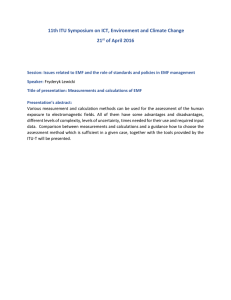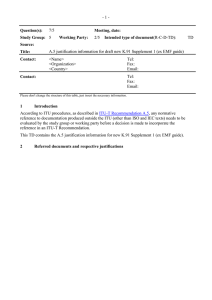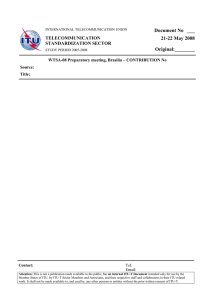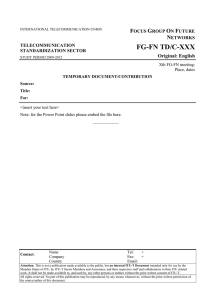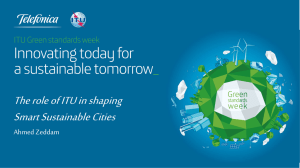ITU Workshop on “With Information and Communication Technologies (ICTs) everywhere -
advertisement
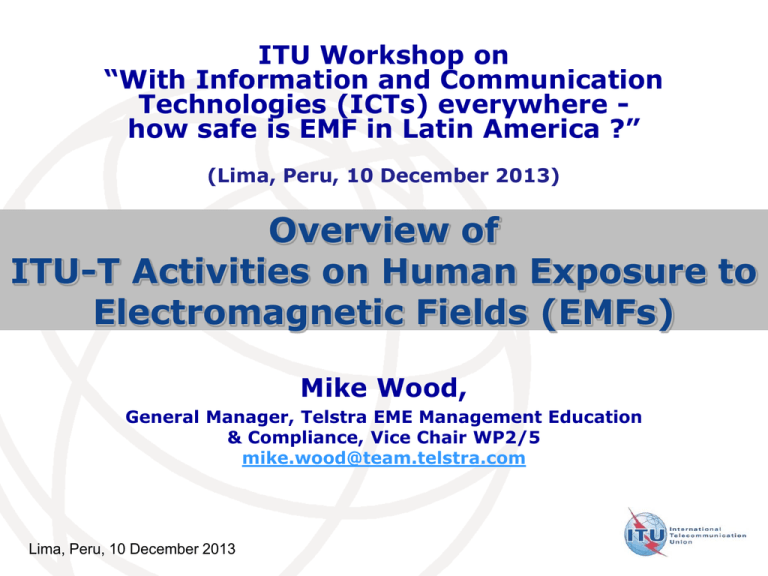
ITU Workshop on “With Information and Communication Technologies (ICTs) everywhere how safe is EMF in Latin America ?” (Lima, Peru, 10 December 2013) Overview of ITU-T Activities on Human Exposure to Electromagnetic Fields (EMFs) Mike Wood, General Manager, Telstra EME Management Education & Compliance, Vice Chair WP2/5 mike.wood@team.telstra.com Lima, Peru, 10 December 2013 Working Party 2/5 “Electromagnetic fields: emission, immunity and human exposure” WP2/5 is responsible for studies relating to achieve EMC of telecommunication installations and safety of telecom personnel and population against electromagnetic fields. Work areas: •Q6/5 - EMC issues arising from the convergence of IT and communication equipment •Q7/5 - Human exposure to electromagnetic fields (EMFs) due to radio systems and mobile equipment •Q8/5 - EMC issues in home networks •Q9/5 - Generic and product family EMC recommendations for telecommunication equipment •Q10/5 - Security of telecommunication and information systems concerning the electromagnetic environment •Q11/5 - EMC requirements for the Information Society Lima, Peru, 10 December 2013 2 WTSA Resolution 72 on measurement concerns related to human exposure to electromagnetic fields Revised and consented at World Telecommunication Standardization Assembly (Dubai, 2012) ITU-T Resolution 72 urges ITU to: expand and continue its work and support in this domain, including but not limited to: disseminating information related to this topic through organizing workshops and seminars for regulators, operators and any interested stakeholders from developing countries; continuing to cooperate and collaborate with other organizations working on this topic and to leverage their work, in particular with a view to assisting the developing countries in the establishment of standards and in monitoring compliance with these standards, especially on telecommunication terminals; Lima, Peru, 10 December 2013 3 Question 7/5 Human exposure to electromagnetic fields (EMFs) due to radio systems and mobile equipment Goals To provide a high level framework for : Managing the human exposure to EMFs (regulatory practices). Guidelines for the assessment of human exposure exposure based on existing ITU-T Recommendations and standards produced by other standards development organizations (SDOs). Ways Measuring techniques Procedures Numerical modeling for evaluating the electromagnetic field due to telecommunication systems and radio terminals. Lima, Peru, 10 December 2013 4 Question 7/5 (Cont’d) Main Study Area: Real site measurements and modeling of the multiple sources operating on different frequencies and transmitting antennas; Determine the validity of electromagnetic field predictions; Procedures and guidance on numerical modeling of EMFs in the areas around telecommunication transmitting antennas and various systems; Guidance based on existing SAR measuring and calculating procedures, techniques and protocols for evaluating EMF due to ICT equipment; EMF Guide (Handbook) to answer frequently questions about human exposure to EMF. Lima, Peru, 10 December 2013 5 Question 7/5 (Cont’d) EMF Guide (Handbook): Objective - to answer the common questions on EMF asked by the public, and to address related concerns; Provide Education and Information Promote EMF information and education resources suitable for all communities, stakeholders and governments Support clarification of the science referencing the WHO and other stakeholders providing information most useful in helping clarify scientific uncertainties e.g. in the areas of RF technology, infrastructure implementation, usage, and consequential EMF exposure Lima, Peru, 10 December 2013 EMF Guide will be online and designed for smart phones, tablets and desktop 6 EMF Guide Draft Contents List Screen Shots Lima, Peru, 10 December 2013 7 ITU-T EMF Web Site Lima, Peru, 10 December 2013 8 ITU-T EMF Brochure Lima, Peru, 10 December 2013 9 Question 7/5 (Cont’d) Main Tasks: Develop Recommendations for the telecommunication sector; Work on activities specified in Resolutions; Collaboration with other standardization bodies (IEC, CENELEC, WHO) in order to avoid duplication of work; Maintenance and enhancement of the existing Recommendations. Lima, Peru, 10 December 2013 10 ITU Recommendations for EMF Assessments ITU-T K.91 guidance on how to assess and monitor human exposure to radio frequency (RF) electromagnetic fields (EMF) in areas with surrounding radio communication installations based on existing exposure and compliance standards – inc advantages and disadvantages of methods (includes software "Uncertainty calculator" and "Watt Guard“) ITU-T K.83 guidance on how to make long-term measurements & monitoring of EMF in the selected areas that are under public concern, in order to show that EMFs are under control and under the limits. ITU-T K.70 defines techniques which may be used by telecommunication operators to evaluate the cumulative (total) exposure ratio in the vicinity of transmitting antennas and to identify the main source of radiation – includes EMF Estimator software ITU-T K.52 Guidance on complying with limits for human exposure to electromagnetic fields (telecommunications installations and handsets) (includes the K.52 calculator software) ITU-T K.61 Guidance to measurement and numerical prediction of electromagnetic fields for compliance with human exposure limits for telecommunication installations Lima, Peru, 10 December 2013 11 Turin Call to Action ITU Workshop on Human Exposure to Electromagnetic Fields (9 May 2013) •Outcome document: Turin Call to Action •Compliance with harmonized EMF Standards and addressing public concern regarding human exposure to electromagnetic fields (EMF) and possible health effects “The rational solution to citizens’ concerns regarding exposure to EMFs is to ensure that the actions of national regulators and network operators are accompanied to the greatest possible extent by transparency and communication with citizens. Compliance with international standards and associated reporting mechanisms assures citizens that regulators and network operators have complied with international best practices in deploying base stations, thereby safeguarding citizens’ health.” Malcolm Johnson, Director, Telecommunication Standardization Bureau Lima, Peru, 10 December 2013 12 Turin Call to Action: 1. Shape the global agenda 2. Lead with vision 3. Standardize 4. Provide education and information 5. Share knowledge and raise awareness 6. Boost partnerships 7. Support clarification of the science 8. Demonstrate success and feasibility 9. Mobilize expertise 10. Annual forum and review Call on ITU-T SG5 to: lead cooperation among standards development organizations (SDOs) in the interests of harmonized international EMF standards; extend its work on human exposure to EMFs by developing and promoting EMF information and education resources accessible to all communities; establish specialised EMF assessment and accreditation training programs for developing countries; promote open online compliance and reporting systems as well as the development of a standardized online system to demonstrate compliance with international EMF standards. Reminder on the importance of collaboration and liaison activities between ITU-SG5 and different organizations such as IEC, WHO Lima, Peru, 10 December 2013 13 Links & Additional Information ITU-T/SG5 “Environment & Climate Change” http://www.itu.int/ITU-T/studygroups/com05/index.asp ITU-T/SG5 Series K Recommendations (free of charge) http://www.itu.int/ITU-T/recommendations/index_sg.aspx?sg=5 ITU-T and EMF http://www.itu.int/ITU-T/emf 1 4 Thank YOU tsbsg5@itu.int Mike.wood@team.telstra.com
